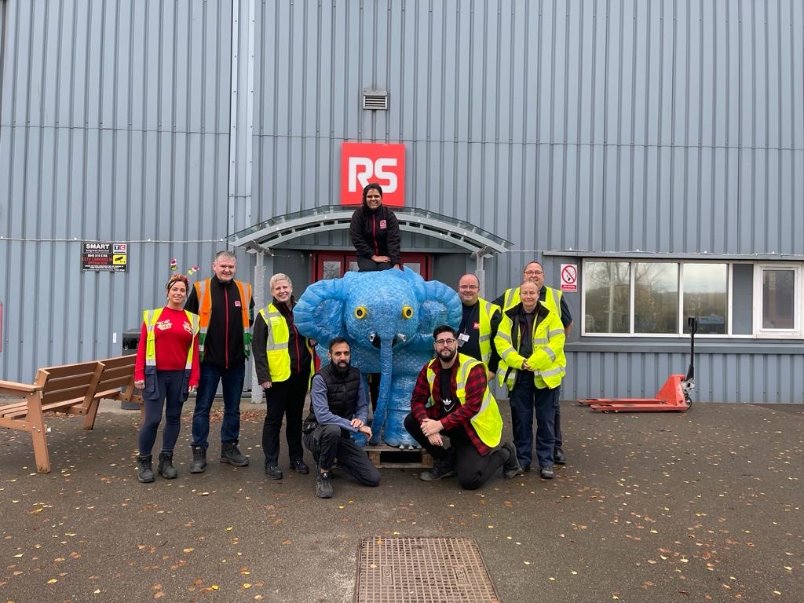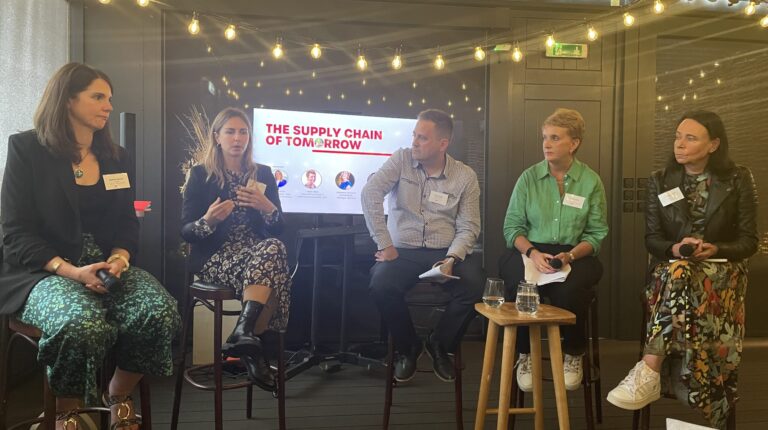With sustainability still a top priority for the logistics sector, industry experts gathered in London to uncover the challenges and opportunities for a more sustainable supply chain now and in the future.
Parcel and Postal Technology International was exclusively invited to The Supply Chain of Tomorrow panel discussion on July 9, hosted by RS Group, which looked to explore four key topics affecting the sustainability of supply chains:
- How sustainable and ethical procurement is emerging as a paramount concern for UK procurement professionals
- The role of technology in driving more sustainable supply chains
- Existing commitments and ways of working that tackle this, including sustainable packaging and distribution logistics
- How leading suppliers and distributors can engage industry partners to join the road to achieve the net zero goal
“The response to climate change and the targets set is not necessarily going to come from governments,” panel host Andrea Barrett, RS Group’s VP of social responsibility and sustainability, told the room. “To meet those targets, businesses must collaborate, break down competitor barriers and become industrial problem solvers.”
Sharing expertise
Barrett was joined by Helen Alder, head of learning and development at CIPS; Katharina Raimann, sustainability manager at Siemens; Carolyn Park, VP of group supply chain at RS Group; and Glynn Hobbs, logistics territory director UK&I at Schneider Electric, who each shared how their companies are addressing sustainable supply chain challenges.
“At Siemens, we have our Degree sustainability framework, which takes a 360° approach to sustainability to guide us in the way we do business all around the world,” explained Raimann. “We look at sustainability with clear targets in six fields of action: decarbonization, ethics, governance, resource efficiency, equity and employability.
“Sustainability should be seen as an investment in the future, not a business cost, because if we really want to see the business thrive in the future, then sustainable procurement and process will be integral to business success in a low-carbon world. It is a business imperative,” she added.
Removing the plastic
A large part of the panel discussion was around internal best practice and how to pass this on to customers – especially when it comes to packaging and transportation of goods along the supply chain.
“It is really important for us to be able to measure what we’re doing, so we set ourselves three main targets: intensity, so how much packaging are we buying and using across our supply chain; the recycled content – how much are we using within our packaging; and the recyclability of the materials that we are using – can they be recycled or reused by ourselves and our customers at the point of delivery,” RS Group’s Park explained.
“Customers feed back regularly about what they’re seeing – especially when it comes to overpackaging and plastic infill, so that is a real target for us.”
Park gave an innovative example of how to engage employees on the reduction of plastics and the recycling of packaging, describing an exercise carried out at RS Group’s biggest distribution center in Nuneaton, where an elephant was created using all the plastic taken out of use within the distribution center.
“It is being used across the whole business to engage our employees in plastic reduction and we’re building on that to remove all plastic out of the materials that are going out to our customers in the next few months,” Park added.

Transportation of goods
The panel also discussed the importance of optimizing the supply chain and stock policies to make sure the right goods are being stocked in the right places to minimize mileage and emissions.
Schneider Electric is also looking to boost the sustainability of its distribution centers and has set a target of carbon neutral by 2025 and net zero by 2030.
Hobbs explained, “We must make the tough decisions about whether it’s the right building and can we make it carbon neutral – and if not, we’ll need to make some bigger changes. We need to evaluate the business case for enhancing our existing infrastructure and logistics network – can it be made to be more efficient within a reasonable investment window – or should we be looking at the embodied carbon and starting again with building new distribution centers.”
The panel also agreed that ‘mode shifting’ is an important focus for logistics companies, exploring how they can move their networks to more sustainable transportation modes – air to road or air to sea – and sending fewer shipments via plane.
“We’re also looking at consolidation,” added Park. “As an MRO supplier, we are getting frequent orders from our customers and historically they go out next day, but we’re looking at options with some of our customers to work differently and consolidate their orders. We might take the orders individually but then consolidate them into one shipment to reduce the number of orders going out each day.”
“It’s about rethinking how we supply and how we sell products – first it’s burn less, and then it’s burn clean,” emphasized Raimann. “Trying to reduce how much we transport, and then for the things we do transport, using clean energy to do so.”
Concluding remarks
A key takeaway from the panel discussion was the importance of industry collaboration but also an understanding that sustainability change can’t happen overnight.
“Sometimes when you’re reading about sustainability, there is this urgent message that it’s got to be solved and we’ve got to move faster – and we have – but this does take time and so it is important not to get disheartened and to see this as a marathon and not a sprint. The commitment has got to be there for the long term to continue to move people forward into a more sustainable future,” Barrett concluded.


